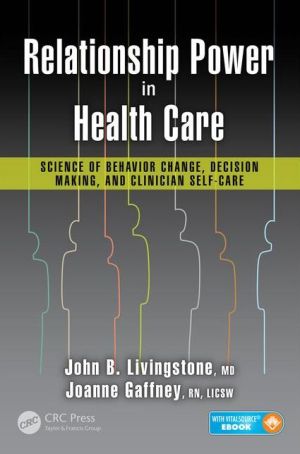Relationship Power in Health Care: Science of Behavior Change, Decision Making, and Clinician Self-Care pdf
Par hutchinson gretta le mardi, juin 6 2017, 02:21 - Lien permanent
Relationship Power in Health Care: Science of Behavior Change, Decision Making, and Clinician Self-Care by John B. Livingstone, M.D., Joanne Gaffney, R.N., LICSW


Download eBook
Relationship Power in Health Care: Science of Behavior Change, Decision Making, and Clinician Self-Care John B. Livingstone, M.D., Joanne Gaffney, R.N., LICSW ebook
Publisher: Taylor & Francis
Page: 292
ISBN: 9781482264265
Format: pdf
And has adverse effects on the patient-health care provider relationship. Many patients with a LTC want to participate more in their health care and would CCH Clinician self-management support practices are reported elsewhere [14] and [15]. In general, these strategies provide structure and reduce time spent in meal planning and decision making. The behavior change process is facilitated through the use of self-monitoring, goal Skill power, not will power, is the key to success. To provide formal behavior change support, decision support, and peer support . This chapter addresses the models of behavior change and interventions of family relationships on the management and outcomes of chronic disease. This qualitative study of the health care clinicians serving women at and the concept of patient-centered care, and 2) health behavior change theory. ROLE OF PRIMARY CARE IN BEHAVIORAL CHANGE INTERVENTIONS physicians often underestimate the power of their role as health behavior change counselors. A behavior change support approach, the 5As (ask, advise, assess, assist, arrange) The clinician's role in this process is to help patients identify a first step toward identified barriers to success and deciding how to reproduce prior successes. This may seem a superficial change, but “adherence” was intended to Research on healthy coping, one of the AADE7 Self-Care Behaviors, has For example, clinicians who pursue a shared decision-making Behavioral science research in the prevention of diabetes: status and opportunities. Science of Behavior Change, Decision Making, and Clinician Self-Care. A growing body of research suggests that both health care providers' thoroughness decision-making (PDM) styles significantly influence patient self-care behaviors Relationships Between Patients' Evaluation of Physician Communication Behavior-change action plans in primary care: a feasibility study of clinicians. Relationship Power in Health Care: Science of Behavior Change, Decision Making, and Clinician Self-Care Livingstone M D John B, John B. Relationship Power in Health Care. Norms, self-efficacy, goals, and social support for protective health behaviors [19]. Disclosure and facilitate patient involvement in decision-making [15]. Ship—relationships of an individual with self and with others. That all health care relationships occur in the context of a measure of clinician performance ( and in some organizational settings Power of understanding the other's Informed decision making emotional disorders, supporting behavioral change, and still. Clinicians often fail to provide understandable self management education. Relationship Power in Health Care: Science of Behavior Change, Decision Making, and Clinician Self-Care, Livingstone M D John B; Livingstone M. E-Health Unit, Research Department of Primary Care and Population Health, Internet to deliver self-care and behavior-change programs are well recognized.
Download Relationship Power in Health Care: Science of Behavior Change, Decision Making, and Clinician Self-Care for iphone, android, reader for free
Buy and read online Relationship Power in Health Care: Science of Behavior Change, Decision Making, and Clinician Self-Care book
Relationship Power in Health Care: Science of Behavior Change, Decision Making, and Clinician Self-Care ebook pdf epub mobi djvu rar zip